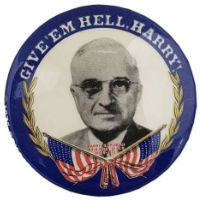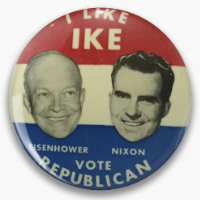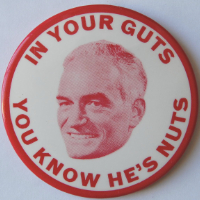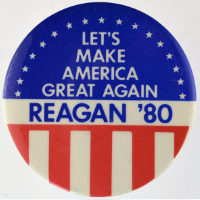

And now we get to some slogans that will be pretty familiar to readers, with some (or maybe all) of them in living memory. Here are the previous installments:
And now, the four most impactful presidential slogans of the latter half of the 20th century:

Give 'em Hell, Harry! (1948): Polling barely existed in 1948, and to the extent that it did exist, it wasn't very good and tended to have a strong Republican bias. Imagine if every pollster was Trafalgar, and you pretty much have the idea.
Consequently, the election wasn't actually as close as it appeared to be. Certainly not close enough to justify "Dewey Defeats Truman." In fact, the president won reelection with a margin of more than 2 million popular votes and more than 100 electoral votes. Still, Harry S. Truman thought he was in trouble, and so he waged the mother of all campaigns, constantly excoriating the Republican-controlled "do nothing Congress," as he called it. "Give 'em Hell, Harry!" thus fit the moment and the strategy very well. Indeed, it's hard to think of a slogan that fit the moment better.
Assuming that Joe Biden runs for reelection (likely) and that the Republican-controlled House serves up 2 years of nonsense (also likely), we imagine the 46th president will be studying the reelection campaign of the 33rd president for some inspiration. "Give 'em Hell, Joe"?

I Like Ike (1952): This may well be the most memorable presidential slogan in U.S. history. It's short. It's simple. It rhymes. It was so good it inspired Dwight D. Eisenhower's opponent to adopt a ripoff version. Unfortunately for Adlai Stevenson, "I'm Madly for Adlai" didn't work quite as well.
That said, we can't declare "I Like Ike" the winner of this competition quite yet. First, Eisenhower was going to win the election of 1952 with or without the slogan. Second, "I Like Ike" is utterly devoid of actual substance. Yes, the General was a genial fellow, and that was certainly part of his campaign. But it says nothing about governance or policy, and there have been plenty of nice-guy presidents who were terrible, along with bad-guy presidents who were pretty good.

In Your Guts You Know He's Nuts (1964): There have been many snarky slogans in presidential electoral history, and we would have liked to include many of them because snark is how we roll. But we cannot make the case that "Who is James K. Polk?," "We Polked you in '44, We shall Pierce you in '52," "Vote for Taft now, you can vote for Bryan anytime," "Make your wet dreams come true" (Al Smith, in favor of ending Prohibition), "I'm just mild about Harry," or "Dick Nixon Before He Dicks You" had a meaningful impact on those campaigns, beyond making people laugh.
"In Your Guts You Know He's Nuts," on the other hand? In 1964, Barry Goldwater adopted the less-than-melodious slogan "In Your Heart, You Know He's Right." And he had the habit of saying politically unwise things, particularly as regards his casual attitude toward nuclear weapons. And so, the satirical Lyndon B. Johnson slogan really crystallized the argument that the president was making, namely that Goldwater simply wasn't fit to occupy the big chair. The snarky slogan didn't do the job alone, but it certainly helped LBJ win in a rout.

Let's Make America Great Again (1980): This was a tough one. Reagan may have been the most consequential president between 1945 and 2000. And he was certainly the most skilled when it came to pithy slogans and sound bites. So, he has to be represented here. But by which slogan?
We came very close to using "It's Morning Again in America," but eventually decided against it for two reasons. The first is that it wasn't really a slogan, it was the tagline from a commercial. The second is that it comes from the 1984 campaign, which Reagan was in no danger of losing.
On the other hand, "Let's Make America Great Again" comes from Reagan's first campaign, which was much, much closer than 1984 was (for most of the campaign, at least, even if The Gipper pulled away at the end). Further, the slogan encapsulates Reaganism extremely well in just five words. His pitch was that he alone knew what was ailing the country and he alone knew how to fix it. That proved to be basically untrue, but people bought it nonetheless.
And then there is the question of long-term impact. Every Republican presidential candidate since Ronnie has adopted some version of his pitch, some version of "America is badly broken, and only I can repair it." And we understand that the slogan itself might have been borrowed by a subsequent Republican presidential candidate, though we are waiting for the staff researcher to get back to us on that.
The latest ballot is here. We welcome comments on this group of slogans (and on the last group; we forgot to include this note last time). The next set of slogans will come from various groups that fought for equality. (Z)